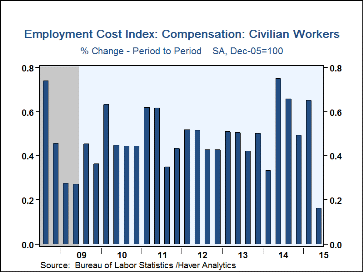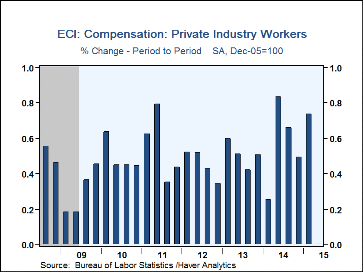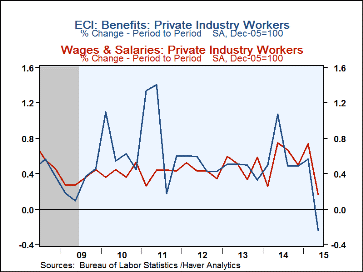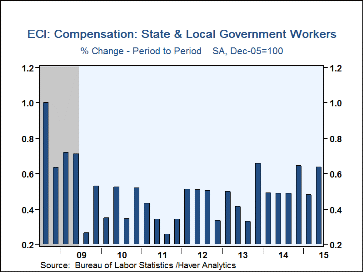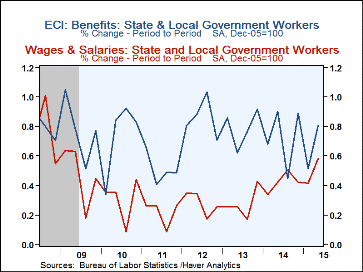 Global| Jul 31 2015
Global| Jul 31 2015U.S. Employment Cost Index Increase Weakens to Record Low
by:Tom Moeller
|in:Economy in Brief
Summary
The employment cost index for civilian workers improved 0.2% in Q2'15 (2.0% y/y), following an unrevised 0.7% Q1 rise. This Q2 performance was the weakest on record and the number fell short of expectations for a 0.6% rise according [...]
The employment cost index for civilian workers improved 0.2% in Q2'15 (2.0% y/y), following an unrevised 0.7% Q1 rise. This Q2 performance was the weakest on record and the number fell short of expectations for a 0.6% rise according to the Action Economics Forecast Survey. The ECI for private industry workers remained unchanged (1.9% y/y) following a 0.7% increase. This also was record quarterly weakness.
There was considerable variation in compensation among industry groups in Q2. A 3.6% decline (-2.0% y/y) in information services and a 1.2% shortfall (+1.4% y/y) in professional and business services led the weakness in compensation. Elsewhere, compensation continued to rise at a moderate pace. Manufacturing compensation increased 0.7% (2.5% y/y) and construction workers' compensation also rose 0.7% (2.1% y/y). Leisure & hospitality workers compensation rose 0.6% (2.4% y/y) and financial activities compensation improved 0.6% (2.3% y/y). The trade, transportation and utilities group realized a 0.6% compensation gain (2.4% y/y) but educational services compensation improved just 0.4% (1.9% y/y).
A 0.1% uptick (1.7% y/y) in benefits was the focus of last quarter's weakness in compensation. It was driven by a 0.2% decline (+1.3% y/y) in private industry benefits, dragged down by a 0.4% drop (+1.1% y/y) in service industries. Benefits of natural resource, construction & maintenance workers declined 0.7% (+0.7 y/y) while benefits of management & professional workers fell 0.6% (+1.2% y/y). Goods producing industries benefits rose an improved 0.6% (2.3% y/y) and factory sector benefits also rose 0.6% (2.8% y/y).
Wages & salaries of civilian workers rose 0.2% (2.1% y/y) and private industry wages also gained 0.2% (2.1% y/y). Leisure & hospitality wages improved a strong 0.7%, lifting the y/y increase to 2.6% and up from 0.9% during all of 2013. Information sector wages increased a stable 0.6% (1.8% y/y) and financial industry wages gained 0.2% (2.4% y/y). These gains were offset by a 1.3% decline (+1.6% y/y) in professional & business services. Construction sector wages rose 0.8%, lifting the y/y increase 2.4%, up from 0.8% in 2010. Factory sector wages gained 0.7% and the 2.4% y/y rise was improved from 1.4% in 2009.
Total compensation for state & local government workers rose 0.6% (2.3% y/y) in Q2. Education workers compensation gained a steady 0.6% (2.3% y/y) while health care and social assistance comp rose 0.3% (2.2% y/y).
The employment cost index figures are available in Haver's USECON database. Consensus estimates come from the Action Economics survey, carried in Haver's AS1REPNA database.
| Employment Cost Index: Civilian Workers (%) | Q2'15 | Q1'15 | Q4'14 | Q2 Y/Y | 2014 | 2013 | 2012 |
|---|---|---|---|---|---|---|---|
| Compensation | 0.2 | 0.7 | 0.5 | 2.0 | 2.1 | 1.9 | 1.9 |
| Wages & Salaries | 0.2 | 0.7 | 0.6 | 2.1 | 1.9 | 1.7 | 1.7 |
| Benefit Costs | 0.1 | 0.6 | 0.6 | 1.7 | 2.5 | 2.3 | 2.4 |
| Private Industry Workers | |||||||
| Compensation | 0.0 | 0.7 | 0.5 | 1.9 | 2.1 | 1.9 | 1.9 |
| Wages & Salaries | 0.2 | 0.7 | 0.5 | 2.1 | 2.0 | 1.9 | 1.8 |
| Benefit Costs | -0.2 | 0.6 | 0.5 | 1.3 | 2.3 | 1.9 | 2.3 |
Tom Moeller
AuthorMore in Author Profile »Prior to joining Haver Analytics in 2000, Mr. Moeller worked as the Economist at Chancellor Capital Management from 1985 to 1999. There, he developed comprehensive economic forecasts and interpreted economic data for equity and fixed income portfolio managers. Also at Chancellor, Mr. Moeller worked as an equity analyst and was responsible for researching and rating companies in the economically sensitive automobile and housing industries for investment in Chancellor’s equity portfolio. Prior to joining Chancellor, Mr. Moeller was an Economist at Citibank from 1979 to 1984. He also analyzed pricing behavior in the metals industry for the Council on Wage and Price Stability in Washington, D.C. In 1999, Mr. Moeller received the award for most accurate forecast from the Forecasters' Club of New York. From 1990 to 1992 he was President of the New York Association for Business Economists. Mr. Moeller earned an M.B.A. in Finance from Fordham University, where he graduated in 1987. He holds a Bachelor of Arts in Economics from George Washington University.
More Economy in Brief
 Global| Feb 05 2026
Global| Feb 05 2026Charts of the Week: Balanced Policy, Resilient Data and AI Narratives
by:Andrew Cates


